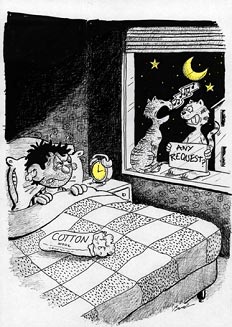Why
is my cat persistently crying?
Most
owner complaints about feline
vocalization are either to do
with the intensity and persistence
of the vocalization, or the
fact that it occurs at night,
when family members or neighbors
are trying to sleep. Attention
getting behaviors, sexual (estrus
or male)  behaviors,
play behavior, medical problems,
discomfort and aggressive displays
are the most common reasons
for feline vocalization. Of
course, since some cats are
quite active at
night, it is not surprising
that many owners are concerned
about their cat's nighttime
vocalization and activity. Some
breeds, such as the Siamese
are much more likely to be vocal
than others. behaviors,
play behavior, medical problems,
discomfort and aggressive displays
are the most common reasons
for feline vocalization. Of
course, since some cats are
quite active at
night, it is not surprising
that many owners are concerned
about their cat's nighttime
vocalization and activity. Some
breeds, such as the Siamese
are much more likely to be vocal
than others.
What
can be done to prevent undesirable
vocalization?
Providing
sufficient play and exercise
during the daytime and evening
may help to schedule the cat
so that it sleeps through the
night. For details on feline
play see ‘Excessive nocturnal
activity in cats'. Never
reward vocalization by providing
food, attention, or play, when
the cat vocalizes. Mild outbursts
of vocalization can either be
ignored or interrupted with
remote punishment techniques
such as a water gun, compressed
air, loud verbal no, or an alarm
device, but never through physical
punishment.
How
can excessive vocalization problems
be treated?
Understanding
the problem
The
cause of the cat's vocalization,
those stimuli that are associated
with the onset of the behavior
as well as all factors that
might be reinforcing the behavior,
must be understood. For some
cats, especially those that
are middle aged or elderly,
veterinary examination is recommended
to rule out potential medical
causes of vocalization such
as pain, endocrine dysfunction
and hypertension. Some older
cats may begin to vocalize as
their senses or cognitive function
begins to decline (senility).
(see our handout on 'Behavior
problems of older pets' for
more details).
Modify
the environment
If
the cat can be denied exposure
to the stimuli for the vocalization
(e.g. the sight or sounds of
other cats), or prevented from
performing the behavior (e.g.
keeping the cat out of the owner's
bedroom at night), the problem
can often be successfully resolved.
Modify
the pet
The
most important aspect of a correction
program is to identify what
may be serving to reinforce
(reward) the behavior. Many
owners inadvertently encourage
the behavior by giving the cat
something it values during vocalization.
Attention, affection, play,
a treat, and allowing the cat
access to a desirable area (outdoors,
indoors) are all forms of reinforcement.
Reinforcement of even a very
few of the vocalization outbursts
perpetuates the behavior. Although
removal of reinforcement (known
as extinction) ultimately reduces
or eliminates excessive vocalization,
the behavior at first becomes
more intense as the cat attempts
to get the reward. This is known
as an extinction burst.
Punishment
Physical
punishment should never be utilized
in cats. Not only is it ineffective
at correcting most behavior
problems, it can also lead to
fear and anxiety of the owner,
people in general or being handled
and petted. Although ignoring
the vocalization, so that the
cat receives no reward for the
behavior, is the best solution,
in the long run it can be difficult
to do. Punishment devices can
be used to interrupt the behavior
immediately and effectively.
A spray of water, an ultrasonic
device, an audible alarm or
a quick puff of compressed air
(from a computer or camera lens
cleaner) is often effective
at stopping the behavior, and
at the same time ensuring that
the cat has received no form
of reward. Punishment that is
not immediately effective should
be discontinued. With some ingenuity,
remote control devices can be
used to activate punishment
devices and remove the owner
as the source of the punishment.
Some cats might be successfully
fitted with a remote citronella
collar so that they can be immediately
interrupted.
What
can be done for cats that vocalize
through the night?
For
those cats that vocalize through
the night, it is first necessary
to try and reschedule the cat
so that it stays awake and active
throughout the daytime and evening.
Food, play, affection and attention
should be provided during the
morning and evening hours, and
as many activities as possible
must be provided for the cat
during the day (cat scratch
feeders, activity centers, or
perhaps even another pet). Drug
therapy may also be useful for
a few nights to help get the
cat to adapt to the new schedule.
Older cats with sensory dysfunction
and geriatric cognitive decline
may begin to wake more through
the night and vocalize more
frequently. These cases will
need to be dealt with individually
depending on the cat's
physical health.
If
the cat continues to remain
awake through the night, there
are two options that might be
considered. The first is to
lock the cat out of the bedroom
by either shutting the bedroom
door, or confining it to a room
or crate with bedding and a
litter box for elimination.
If the cat is ignored it may
learn to sleep through the night,
or it may be able to keep itself
occupied if there are sufficient
toys, activities or another
cat to play with. Under no situation
should the owner go to the cat
if it vocalizes (even to try
and quiet it down) as this will
reward the behavior. If the
cat must be allowed access to
the bedroom, inattention, and
punishment devices such as an
ultrasonic alarm, compressed
air, or a water sprayer, can
be used to decrease or eliminate
the cat's desire to vocalize.
Will
neutering help?
If
your cat is an adult male or
female and not yet neutered,
then some forms of vocalization
are associated with communication,
especially with regard to estrus
cycles and mating. Cats in estrus
are particularly vocal "calling".
Neutering should help to reduce
vocalization in these cats.
Neutered
animals still may wish to go
outside and roam. If there are
other cats in the neighborhood
that frequent the home territory,
this may encourage your cat
to vocalize. Blocking visual
access, and providing "white
noise" may help if you
are unable to get the outdoor
cats to leave your property.
This client
information sheet is based on
material written by Debra Horwitz,
DVM, DACVB and
Gary Landsberg, DVM, DACVB.
© Copyright 2002 Lifelearn
Inc. Used with permission under
license. March 11, 2004. |